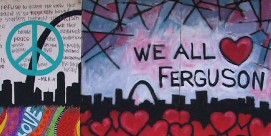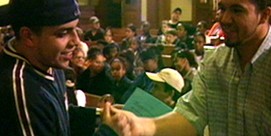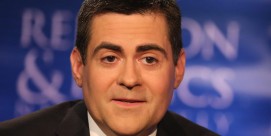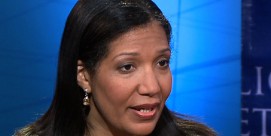BOB ABERNETHY, host: This week faith leaders continued appealing for calm in the wake of the Baltimore riots that were triggered by the death of Freddie Gray, a 25-year-old-black man who died after suffering a spinal injury while in police custody. The riots resulted in extensive property damage and more than 250 arrests. Clergy were among those leading peaceful demonstrations against police violence in Baltimore and several other cities. The National Council of Churches said “African-American men and women are dying at the hands of the policy, and the nation must correct this injustice immediately.”
Now this week’s racial upheaval in Baltimore: the messages it sent, and what the replies should be. Eugene Sutton is the Episcopal Bishop of the Diocese of Maryland. Bishop, welcome back here.
BISHOP EUGENE SUTTON (Episcopal Diocese of Maryland): Thank you, Bob.
ABERNETHY: What were the most important messages that came out of this violence?
SUTTON: Well, I think one of the most important messages is that eventually justice has to be done in order for there to be peace. This past week in Baltimore has been very difficult for us. On Monday, the city exploded in many of its parts. And on Monday evening, many of its neighborhoods were burning, and looting was happening. On Tuesday morning, we wept as we did Monday night. We wept, we grieved over the loss. But then we picked ourselves up.
ABERNETHY: But it was almost as if everybody had kind of decided—gangs and church leaders—and everybody said, “Wait a minute.”
SUTTON: Yes. It took many parts of very many communities to make peace in Baltimore. You mentioned the gang leaders. The Bloods and the Crips had a historic agreement to say they would not be fighting each other this week, and they were going to help quell the violence. Religious leaders from all over the city, Christian mainly, Muslim and Jewish leaders, got out on the streets and congregations and really proclaimed a message of hope and of nonviolence and peace. City officials did the same.
ABERNETHY: Yeah. So now the policemen have been charged with—
SUTTON: Yes, the six policemen have been charged in the death of Freddie Gray, who died while [he was] in [their] custody.
ABERNETHY: So what are the immediate steps that now need to be taken?
SUTTON: Well, we are so happy that the policemen were charged because this has been going on for many years, and that gave rise to a lot of the rage. Well over a hundred incidents have—of police abuse—have been recorded in the last couple of years, of persons dying and being injured in police custody. That has given rise to rage. So what needs to be done is exactly what has started to happen in Baltimore now: accountability for brutality. I might mention one other thing. We know that black-on-black crime is a big problem in the communities, and we expect the police officers to protect us from the criminals. But when the officers are themselves the abusers, then that gives rise to rage, and we saw that on Monday.
ABERNETHY: And you’ve said, and I think that others have, the wonder is that it didn’t break out earlier.
SUTTON: Yes, we weren’t surprised that there was a conflagration on Monday. The biggest surprise in the black community was that it hadn’t happened earlier. The city has paid out millions of dollars in abuse cases. But it’s not just that. It is the cycle of hopelessness and poverty and violence that has been building up for years.
ABNERNETHY: Well, let me ask you about that, because there are things that have to be done and will be done, I’m sure, right away, and the church can be involved in that. But down the road, the big things that seems to me that have to be done have to do with jobs and schools, primarily. So what can the church do to help that happen?
SUTTON: Well, the church has a moral voice that it can use in saying to its members, “We need to create jobs.” You mentioned jobs, of course, and lack of jobs gives rise to more poverty, ill housing, no good schools, and life expectancy. What a lot of people don’t realize is that 15 Baltimore neighborhoods have life expectancies lower than that of North Korea. Eight neighborhoods in Baltimore have a lower life expectancy than Syria, and Syria’s at war. We are talking about dire conditions—not all over the city, but the poverty in Baltimore—if those eight neighborhoods were a nation, it would be one of the poorest nations in the world. And what the church can do about that is give, is help partner with the private sector and with government to say, “What can we do to create jobs, have better schools?” It’s going to take all of us. It’s not just the church’s duty, it’s not just the government’s duty or the private sector. It’s all of us working together, and we’ve started to do that in Baltimore.
ABERNETHY: And very quickly, you had an occasion after a meeting this past week when you and everybody in the church went out in the streets.
SUTTON: Oh yes. It’s a—the church should never lose its voice, and I really mean that literally. Just last night I was with a church group. It was one of our wealthiest churches in Baltimore, predominantly white church. But they were in downtown, and some of those stores were looted. After the prayer service for Baltimore, we literally walked the streets singing, bearing the cross. And many people in the community—the homeless, drivers—they were honking their horns, and they were clapping for us and taking pictures. And they were basically saying, “Thank you. Thank you for being out here. You lift us up, and we know that you are with us.” Imagine a congregation of mostly white folk singing for Freddie Gray who died. That’s the kind of thing that the church needs to do: bring people together.
ABERNETHY: Many thanks, Eugene Sutton, the Episcopal Bishop of Maryland.
SUTTON: Thank you.





